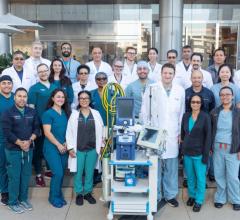
October 27, 2017 — New Milford, Conn., resident Neta Awasthi is thankful to be home with his wife, Rhicha, and two teenage daughters after what they deem a miraculous recovery from a sudden, life-threatening health crisis that nearly took his life.
On June 3, 2017, Awasthi was rushed to the Danbury Hospital Emergency Department (ED) immediately after an office visit with his primary care physician and a diagnosis of pneumonia. Once at Danbury Hospital, a chest X-ray revealed he was suffering from a severe case of bilateral pneumonia and rapidly developed adult respiratory distress syndrome (ARDS), a critical condition attributed to failure of the lungs to oxygenate blood, resulting in abnormally low oxygen levels in the blood, leading to multisystem organ failure and death. Because his clinical condition was quickly deteriorating, Awasthi was admitted to the intensive care unit (ICU).
While in the ICU, despite all available treatments, Awasthi subsequently suffered two cardiac arrests and his condition was progressively worsening. “We were unable to ventilate and oxygenate him,” said Sakshi Sethi, M.D., pulmonary physician and critical care attending.
After consultation with Eugene Fernandes, M.D., cardiothoracic surgeon, Western Connecticut Medical Group, it was decided the best option would be to place Awasthi on extracorporeal membrane oxygenation (ECMO), a bedside heart-lung machine that takes over the functions of the heart and lungs, thus providing both cardiac and respiratory support. Sethi said, “ECMO is a modality of salvaging patients after cardiac arrest, and if timely and expeditiously instituted, result in positive outcomes.”
ECMO was promptly started at his bedside by Fernandes and physician assistant Dean Rivers of the Cardiac Surgery team and was maintained by William Maldarelli, Steven Toplitz and Jeanne DiNardo of the cardiac surgery perfusion team. “With expert management by the cardiac surgery team in conjunction with the critical care physicians and nurses we were able to stabilize him,” said Sethi.
The following morning after determining Awasthi was stable and awake responding to commands, Danbury Hospital’s affiliate for assist devices, Montefiore Medical Center, was contacted and he was transferred for further management.
Four weeks later, Awasthi left the hospital fully recovered, both functionally and neurologically intact.
For more information: www.wchn.org
Use of ECMO Support COVID-19 Patients:
VIDEO: ECMO Support Effective in Sickest COVID-19 Patients — Interview with Ryan Barbaro, M.D.
ECMO Used to Treat Adult Respiratory Distress Syndrome Case
ECMO Support Found Effective in Sickest of COVID-19 Patients


 September 13, 2023
September 13, 2023 









